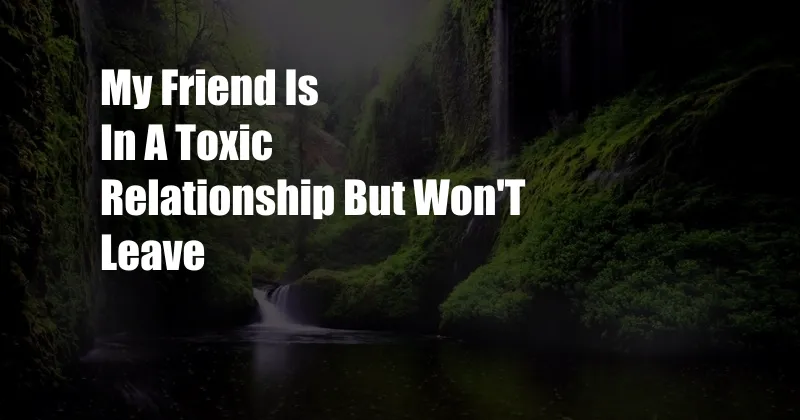
My Friend’s Toxic Relationship: Unraveling the Entanglement
In the entangled tapestry of friendship, we encounter threads that bind us together, and at times, threads that weigh us down. It is with a heavy heart that I witness a dear friend navigating the treacherous waters of a toxic relationship, a labyrinth where love and pain are inextricably intertwined. Despite my entreaties, she remains ensnared, her spirit slowly dimming amidst the suffocating embrace of her partner.
The dynamics of toxic relationships are complex and insidious. They often begin with the intoxicating allure of passion, a whirlwind of emotions that sweeps individuals off their feet. However, as the relationship deepens, a subtle shift occurs, transforming the initial euphoria into a suffocating web of manipulation, control, and emotional torment.
Warning Signs of Toxic Relationships
Recognizing the toxic nature of a relationship is crucial for breaking free from its clutches. Here are some warning signs to watch out for:
- Emotional abuse: Constant criticism, belittling, gaslighting, and isolation.
- Physical abuse: Pushing, hitting, or any form of physical violence.
- Control: Dictating clothing, social interactions, and financial decisions.
- Jealousy: Excessive possessiveness, unreasonable accusations of infidelity.
- Unpredictability: Mood swings, violent outbursts, or extreme emotional reactions.
Understanding the Psychology of Toxic Relationships
Understanding the psychology behind toxic relationships is essential for both the individual trapped within them and those who care about them. The cycle of abuse often follows a predictable pattern:
- Idealization: The abuser presents themselves as charming, loving, and perfect.
- Devaluation: Once the victim is emotionally invested, the abuser begins to criticize, demean, and undermine their self-esteem.
- Reconciliation: After a period of devaluation, the abuser apologizes profusely and showers the victim with affection, creating a false sense of hope.
- Repeat: The cycle continues, with each episode of reconciliation reinforcing the victim’s belief that the relationship can be saved.
This relentless cycle of abuse can have devastating consequences for the victim’s mental, emotional, and physical health. It can lead to anxiety, depression, low self-esteem, and even suicidal thoughts.
Breaking the Cycle
Breaking free from a toxic relationship is an arduous but necessary journey. Here are some tips and expert advice:
- Seek support: Reach out to trusted friends, family, or a therapist for emotional support and guidance.
- Create a safety plan: Plan an escape route in case of an emergency, including a safe place to go and trusted individuals to contact.
- Set boundaries: Establish clear limits with the abuser, limiting contact and refusing to engage in unhealthy behaviors.
- Practice self-care: Prioritize your own mental and physical well-being through therapy, mindfulness, and healthy habits.
- Don’t blame yourself: Understand that you are not responsible for the abuser’s behavior, and don’t internalize their attacks on your self-worth.
FAQ on Toxic Relationships
Q: Why do people stay in toxic relationships?
A: There are many reasons why individuals remain in toxic relationships, including fear of retaliation, financial dependency, low self-esteem, and a belief that they can “fix” the relationship.
Q: What are the long-term effects of toxic relationships?
A: Toxic relationships can have lasting negative effects on mental, emotional, and physical health, such as anxiety, depression, post-traumatic stress disorder, and chronic health conditions.
Q: How can I help a friend in a toxic relationship?
A: Offer unconditional support, listen attentively without judgment, encourage professional help, and respect their decision-making process.
Conclusion
Witnessing a friend endure the agony of a toxic relationship is heartbreaking. It is imperative to remember that you are not alone in this journey. By providing support, understanding, and expert guidance, we can help empower our loved ones to break free from the suffocating embrace of toxicity. Remember, love should be a source of joy, not pain. If you or someone you know is struggling in a toxic relationship, know that there is hope for a better future.
Are toxic relationships a topic that interests you? Share your thoughts and experiences in the comments below.